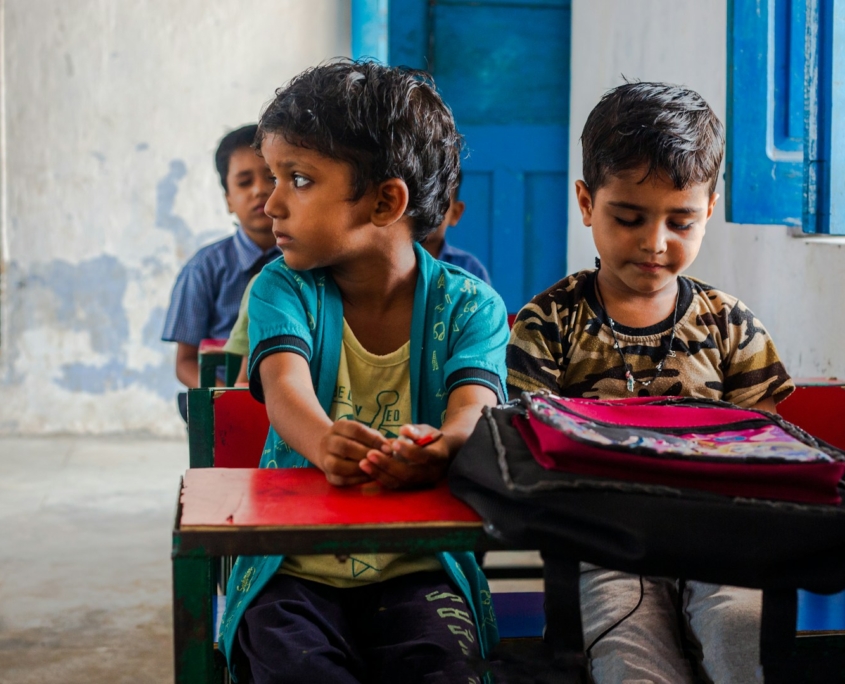Revolutionizing Education in Rural India with Mobile Schools
 India, with its vast and diverse rural expanse, faces significant challenges in providing quality education to every child. Geographic isolation, socio-economic barriers and a shortage of infrastructure often leave rural children with limited or no access to schooling. In response to these challenges, innovative mobile schools emerge as a beacon of hope, transforming education in rural India.
India, with its vast and diverse rural expanse, faces significant challenges in providing quality education to every child. Geographic isolation, socio-economic barriers and a shortage of infrastructure often leave rural children with limited or no access to schooling. In response to these challenges, innovative mobile schools emerge as a beacon of hope, transforming education in rural India.
Moreover, operating from buses outfitted with educational materials, technology and dedicated teaching staff, these schools bridge the gap, make education accessible and contribute to the fight against poverty through education. This article explores the inception, impact and future of mobile schools in India, underlining their significance in societal betterment and the innovative approach of mobile classrooms.
The Significance of Education in Societal Betterment
Education is universally acknowledged as a fundamental pillar for societal development and poverty alleviation. In India, where a significant portion of the population resides in rural areas, the disparity in educational access exacerbates the cycle of poverty.
The United Nations Educational, Scientific and Cultural Organization (UNESCO) emphasizes that education is crucial for sustainable development, as it empowers individuals with the knowledge, skills and values needed to live and work sustainably. Mobile schools in India embody this principle by extending educational opportunities to marginalized communities, thus playing a vital role in societal upliftment.
The Innovative Approach of Mobile Classrooms
Mobile schools in India utilize buses converted into classrooms to reach remote villages. These buses are equipped with learning materials, digital technology and a team of educators, offering a comprehensive curriculum ranging from basic literacy and numeracy to environmental education and digital literacy. The Ekal Vidyalaya Foundation, for instance, operates with the vision of holistic education and development in rural and tribal India, running numerous mobile schools that serve as a model for nonformal education.
One innovative example is the “School Bus Project” by the NGO Round Table India, which has successfully converted buses into mobile classrooms to provide education to children in slums and remote villages. These mobile schools are not only about academic learning but also focus on extracurricular activities and health education, ensuring a well-rounded development for the children.
New Developments in Mobile School Initiatives
The mobile school initiative in India is continually evolving, integrating new technologies and pedagogical approaches to enhance the learning experience. Some mobile schools incorporate solar power and satellite internet connectivity, exemplifying this evolution and enabling the use of digital learning tools and resources in areas without electricity or internet infrastructure.
Furthermore, partnerships with tech companies lead to the development of customized educational apps and platforms tailored to the needs of rural students, enabling personalized learning experiences.
Challenges and Limitations
Despite their success, mobile schools in India face several challenges. These include the maintenance of vehicles, scalability to more remote areas, and the adaptation of curriculum and teaching methods to the diverse linguistic and cultural backgrounds of rural students. Additionally, it is crucial to sustain funding and support from governmental and nongovernmental organizations for the long-term impact of these initiatives.
Looking Forward
Mobile schools in India represent a remarkable innovation in education, offering a lifeline to children in rural areas who are otherwise deprived of learning opportunities. By overcoming geographical and socio-economic barriers, these mobile classrooms play a pivotal role in the fight against poverty through education.
Above all, as this initiative continues to grow and evolve, it holds the promise of shaping a brighter future for rural India, where every child has access to quality education. Moreover, the success of mobile schools underscores the importance of innovative solutions in addressing educational disparities and highlights the transformative power of education in societal betterment.
– Hosna Hossain
Photo: Unsplash
